Defibrillators for dental practices
The Resuscitation Council (RCUK) states that all dental practices should have immediate access to an automated external defibrillator (AED). The defibrillator should be well-maintained and ready to use. The General Dental Council endorses these guidelines.
Why are defibrillators needed for dental practices?
A sudden cardiac arrest can happen at any place and time. Dental procedures, especially dental surgery, require fast action in case of cardiac arrest. CPR training for practitioners and having a defibrillator on site increase the survival rates.
Suitable automated external defibrillators (AEDs) for dental practices
A defibrillator should be available to anyone visiting a dental practice. Therefore it is recommended to opt for a defibrillator with child mode or the ability to use paediatric electrodes. Our top choices are the CU Medical i-PAD SPI and the Mindray Beneheart C1A AED, both of which come with integrated child mode. Other options include the Heartsine Samaritan devices, which require the PediPak (battery and pads in one) for the child mode. The AEDs below are low maintenance and have an excellent price/quality ratio.
Requirements for AEDs in dental practices
✓ AED with child mode or paediatric pads
✓ Provided with a rescue kit which includes at least one pair of scissors and a razor
✓ Accessible within 1 minute
✓ The AED's location marked with a recognisable ILCOR wall sign
✓ Weekly AED checks and regular maintenance
To increase the visibility and lifespan of the device, we recommend a complementary wall box.
-
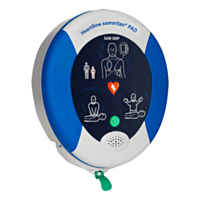 + Free wall CabinetHeartsine Samaritan PAD 500P DefibrillatorManufacturer : HeartsineSemi or full automatic : Semi AutomaticQuality label : CE, FDAThe HeartSine Samaritan PAD 500P semi-automatic AED
+ Free wall CabinetHeartsine Samaritan PAD 500P DefibrillatorManufacturer : HeartsineSemi or full automatic : Semi AutomaticQuality label : CE, FDAThe HeartSine Samaritan PAD 500P semi-automatic AED
Has all of the features of the 350P and 360P Gives visual and auditory resuscitation feedback LCD display ICG Software to increase survival chances
See the full description below for more information, specifications and details of our service and maintenance contracts.
Contact us for advice. -
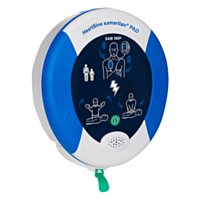 + Free wall CabinetHeartSine Samaritan PAD 360P DefibrillatorManufacturer : HeartsineSemi or full automatic : Fully AutomaticQuality label : CE, FDAHeartsine 360P Fully automatic AED Compact and lightweight portable AED Easy to use SCOPE Technology – HeartSine’s unique biphasic waveform. The samaritan PAD has a rating of IP56, providing the 350P defibrillator with the highest level of protection from dust or moisture pollution. Also available as a semi-automatic AED See full description below for more information, specifications and details of our service and maintenance contracts.
+ Free wall CabinetHeartSine Samaritan PAD 360P DefibrillatorManufacturer : HeartsineSemi or full automatic : Fully AutomaticQuality label : CE, FDAHeartsine 360P Fully automatic AED Compact and lightweight portable AED Easy to use SCOPE Technology – HeartSine’s unique biphasic waveform. The samaritan PAD has a rating of IP56, providing the 350P defibrillator with the highest level of protection from dust or moisture pollution. Also available as a semi-automatic AED See full description below for more information, specifications and details of our service and maintenance contracts. -
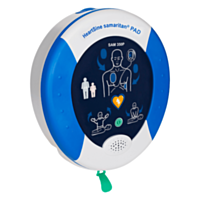 + Free wall CabinetHeartsine Samaritan PAD 350P DefibrillatorManufacturer : HeartsineSemi or full automatic : Semi AutomaticQuality label : CE, FDAThe Heartsine Samaritan PAD 350P Compact and lightweight portable AED Easy to use SCOPE Technology – HeartSine’s unique biphasic waveform. The samaritan PAD has a very high IP56 dirt and water protection rating. Also available as a fully automatic AED click here See full description below for more information, specifications and details of our service and maintenance contracts.
+ Free wall CabinetHeartsine Samaritan PAD 350P DefibrillatorManufacturer : HeartsineSemi or full automatic : Semi AutomaticQuality label : CE, FDAThe Heartsine Samaritan PAD 350P Compact and lightweight portable AED Easy to use SCOPE Technology – HeartSine’s unique biphasic waveform. The samaritan PAD has a very high IP56 dirt and water protection rating. Also available as a fully automatic AED click here See full description below for more information, specifications and details of our service and maintenance contracts. -
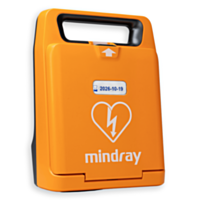 + Free wall CabinetMindray BeneHeart C1A V2 Defibrillator Fully-AutomaticManufacturer : MindraySemi or full automatic : Fully AutomaticQuality label : CEThe Mindray BeneHeart C1A V2 is ideal for both experienced rescuers and the general public. Thanks to the new LCD screen, instructions are now even clearer. In addition, the new audio alarm ensures that fault signaling is even more noticeable.
+ Free wall CabinetMindray BeneHeart C1A V2 Defibrillator Fully-AutomaticManufacturer : MindraySemi or full automatic : Fully AutomaticQuality label : CEThe Mindray BeneHeart C1A V2 is ideal for both experienced rescuers and the general public. Thanks to the new LCD screen, instructions are now even clearer. In addition, the new audio alarm ensures that fault signaling is even more noticeable. -
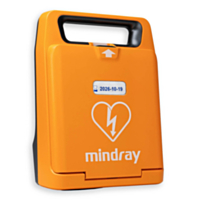 + Free wall CabinetMindray BeneHeart C1A V2 Defibrillator Semi-AutomaticManufacturer : MindraySemi or full automatic : Semi AutomaticQuality label : CEThe Mindray BeneHeart C1A V2 is a renewed defibrillator with an excellent price/quality ratio. Thanks to the new LCD screen, instructions are now even clearer. In addition, the new audio alarm ensures that fault signaling is even more noticeable.
+ Free wall CabinetMindray BeneHeart C1A V2 Defibrillator Semi-AutomaticManufacturer : MindraySemi or full automatic : Semi AutomaticQuality label : CEThe Mindray BeneHeart C1A V2 is a renewed defibrillator with an excellent price/quality ratio. Thanks to the new LCD screen, instructions are now even clearer. In addition, the new audio alarm ensures that fault signaling is even more noticeable.